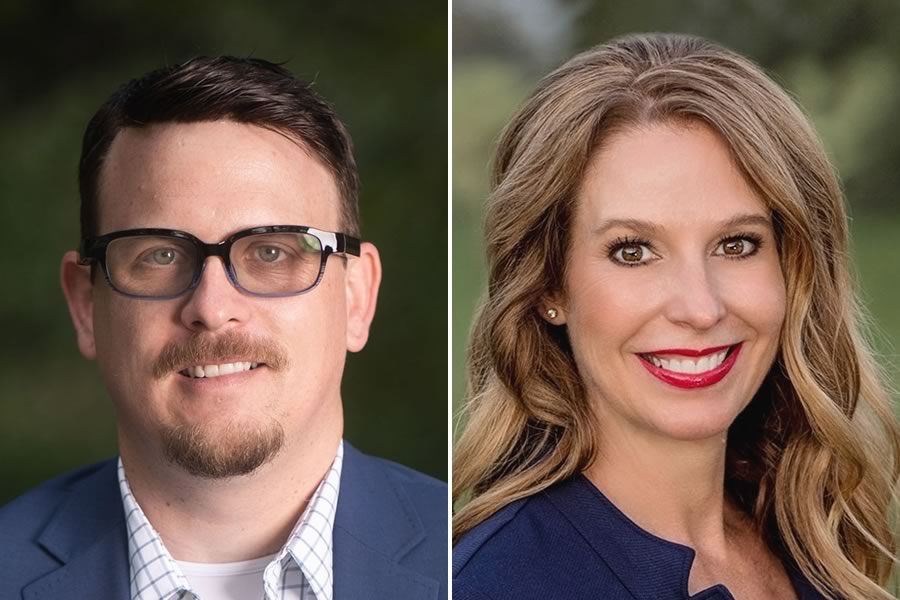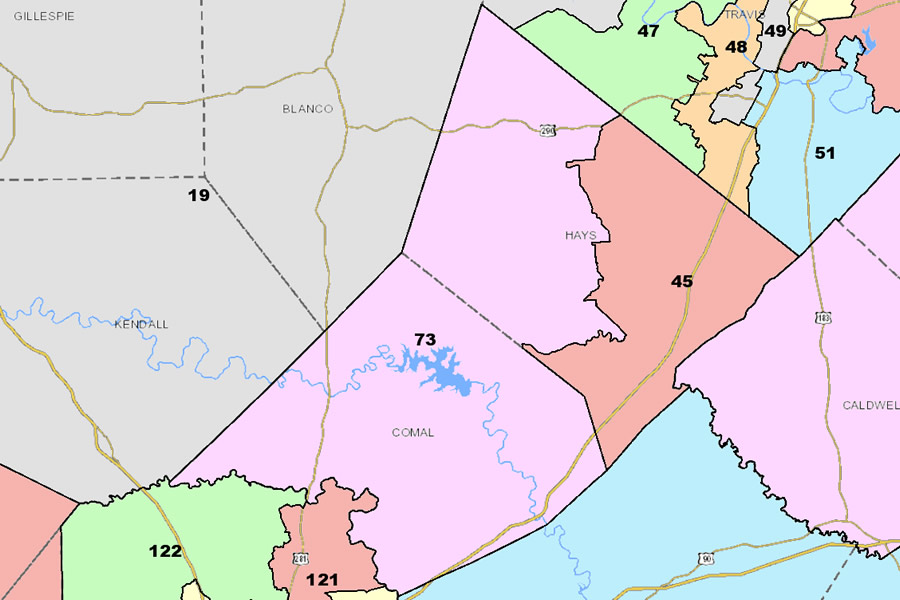Justin Calhoun
Carrie Isaac
2022 General Election
In the newly redrawn House District 73, Carrie Isaac faces Justin Calhoun to replace retiring Representative Kyle Biedermann. We are grateful to both candidates for taking the time to meet with us, answer our questionnaire, and discuss issues of environmental importance in Comal and Hays counties: clean air, water quality and quantity, reforming TCEQ, and common-sense supervision of quarries and other aggregate production operations (APOs).

Justin Calhoun would be a welcome representative of our concerns and efforts. Not only does he talk the talk, but Mr. Calhoun invests personally in caring for our environment: he took time out of his busy schedule to join our July Adopt-A-Highway event and clean up the roadside adjacent the Vulcan property. Mr. Calhoun, from Comal County, served in the Army, deployed to Afghanistan, and is now a social worker. He shares our concern with the lack of APO oversight by TCEQ and the critical need to protect our precious natural resources such as the Edwards Aquifer.
Carrie Isaac, from Dripping Springs, leads a nonprofit focused on assisting veterans. In 2015, she worked with her husband, Jason, during his time as state representative for Hays and Blanco counties, to draft and pass HB 3405, empowering local groundwater conservation districts and increasing protection of the Trinity Aquifer. Ms. Isaac recognizes that standard air permits TCEQ so frequently rubber stamps are wholly inadequate to protect Texans living near these plants.
Ms. Isaac has some questionable industry connections. But both candidates have assured us that preserving our natural resources is a high priority: either would pick up the mantle of Representative Biedermann and work hard to protect Hill Country citizens and our private property from unnecessary and unacceptable industrial pollution.
Early voting begins on October 24 and election day is November 8, 2022. Visit the Comal County Elections webpage or VoteTexas.gov for polling locations and sample ballots. Candidate responses to our questionnaire are listed below.
Candidate Questionnaire
Preserve Our Hill Country Environment sent a candidate questionnaire to both candidates in August, then followed up with each candidate. Responses from each candidate are shown below verbatim. As per instructions, responses have not been edited for spelling, punctuation, or grammatical errors. “No response received” is shown for any candidate who did not reply.
Question 1. Texas is currently suffering through a major drought, and many private well owners in HD73 are reporting that their wells in the Trinity Aquifer are going dry. Record population growth in the area has resulted in greatly increased water demand. State law currently limits the authority of counties to deal with land use issues related to rapid growth in unincorporated areas. What authority would you be willing to grant county commissioners and Groundwater Conservation Districts (GCDs) to manage new development activity to ensure that water demand never exceeds water availability?
Calhoun: Development is unavoidable, but it should be managed. Counties should have the authority to place some conservation restriction in the pursuit of protecting access to water and other life sustaining resources. Texas is proud to uphold private property rights, but those rights should stop at resources that the community as a whole need to survive and thrive. Ensuring access and protection of clean drinking water is a priority.
Isaac: Water is our most precious natural resource, and groundwater conservation districts play a critical role in protecting our groundwater. When my husband served in the Texas House, I advocated for and helped pass HB3405 which ensured all of Hays County was in a GCD which protected surrounding landowners from commercial wells. While I do not believe counties should be given more powers to regulate land use — these powers belong to cities — I would be open to further discussion on how we can ensure GCDs can preserve groundwater while still respecting private property rights.
Question 2. Vulcan Construction Materials will have to submit a Water Pollution Abatement Plan (WPAP) outlining best management practices needed in order to protect water quality in the Edwards Aquifer recharge zone for their proposed 1500-acre quarry in Comal County. Water quality and supply are vital to District 73—both as a foundation for the local tourism industry as well as for human consumption, agriculture, and wildlife. Heavy industrial operations, quarries, and mining directly over the environmentally sensitive Edwards Aquifer recharge and contributing zones endanger one of our most precious natural resources—water. When Vulcan submits their WPAP for this facility, how, specifically, will you be involved and what actions will you take as a state representative?
Calhoun: I would have the WPAP evaluated by non-bias third party specialists that can shine a light on any discrepancies or possible issues. I will advocate for any changes and ensure that the company will take full responsibility for any possible contamination as this would be detrimental to all of HD-73. I want to support industrial growth as we need it, but not to the determent of Texans.
Isaac: I will work closely with TCEQ to ensure water quality and supply is a top priority in consideration for the Vulcan project.
Question 3. There are repeated examples of Texas Hill Country streams experiencing algal blooms and eutrophication following the implementation of wastewater facilities that had been approved by the TCEQ. Would you support requiring TCEQ to use water purity standards tailored to the Hill Country so as not to harm aquatic wildlife?
Calhoun: Algae blooms can be caused by a variety of issues with cleaned water. For example, high levels of phosphorus can lead to algae blooms and increased aquatic plant growth lowering the dissolved oxygen in water being detrimental to fish and continuing to negatively impact the local food chains. When issues like this arise TCEQ needs to determine the cause and implement a solution.
Isaac: I believe we must balance our infrastructure needs with preserving and protecting our environment. One size does not always fit all when it comes to environmental standards. I welcome the opportunity to discuss and research this issue further and determine what, if any, standards should be changed.
Question 4. In 2021, the House Interim Committee on APOs published a report laying out the issues associated with Aggregate Production Operations (APOs). The report spelled out background on each issue, the current regulatory scheme, and recommendations on how to improve the APO industry in Texas. Are you familiar with the report and its recommendations? Which of its recommendations do you think are most important? Are you willing to work across party-lines to enact laws to achieve these goals?
Calhoun: Yes. I’m familiar with the report having read it when it came out. I agree with their suggested interventions and believe they should be implemented.
Isaac: Yes, I am familiar with the report’s recommendations and am willing to work across party-lines to ensure we strike the right balance and ensure a consistent, predictable regulatory environment that protects the environment and private property rights, while ensuring business continues to thrive in Texas.
Question 5. In 2019, Representative Terry Wilson (District 20) introduced HB 509 and Representative Kyle Biedermann (District 73) introduced HBs 3798 and 2871. Will you author and support identical legislation?
Calhoun:I will author and implement similar legislation, with some changes due to unintended consequences these bills may cause for other industries. When we write legislation it should be focused on the issues, we need corrected with little to no unintended consequences as possible.
Isaac: Yes. I have spoken with both Rep. Terry Wilson and Rep. Biedermann on this issue at length, and both have endorsed my candidacy. I believe business and community interests do not have to be mutually exclusive. APOs currently have very little regulation with almost no requirements beyond a standard air quality permit. We must create some sort of regulatory structure around this industry to ensure surrounding private property is protected from harm and nuisance.
Question 6. It has been recognized that the Texas Commission on Environmental Quality (TCEQ) has major, systemic problems related to regulation and permitting of APOs such as quarries, concrete batch plants, asphalt plants, and other similar facilities. With TCEQ up for sunset review in the next legislative session, would you be willing to work with the Texas Sunset Commission to improve TCEQ permitting and their authorization of common-sense rules, oversight, and enforcement? What do you see as the biggest issues facing TCEQ and what needs to be done to solve them? How will you champion institutional change to improve TCEQs reputation with District 73
constituents?
Calhoun: TCEQ was intended to protect the environment of Texas ensuring that growth does not place our environment or Texas residents in avoidable situations that can permanently harm our community. From my experiences I have seen we have patient educated staff at TCEQ, however, legislatively they need to be equipped with tools to do their jobs and protect Texans.
Isaac: The Sunset Process is an excellent opportunity to audit and evaluate state agencies to ensure they are properly serving the people of Texas. I look forward to working with my fellow legislators to improve TCEQ and ensure the agency is more open, transparent, and easy to work with for citizens and private businesses.
Question 7. The mission of Preserve Our Hill Country Environment is to preserve, protect, and restore the land, water, air, wildlife, unique features, and quality of life in the Texas Hill Country against the aggressive and insufficiently regulated expansion of the aggregate industry. Considering our mission and the interest of our over 5,000 members, followers, and supporters, where do our priorities fit in to your legislative agenda? Do you think you can adequately represent our concerns and what will your strategy be to successfully represent District 73 in these undertakings?
Calhoun: There has forever been a fight between industrial growth and residents. But with good reasons as historically we have seen industries do not always on their own priorities the safety and wellbeing of the citizens or the environment. I will always priorities the safety of our community members while supporting industrial and commercial growth we need. I am not an expert in these field however, my goal is to work with experts on both sides to ensure safe environmentally friendly development.
Isaac: Texas is a pro-business state, but that doesn’t mean that industry has free reign to trample on the private property rights of Texans. Industry and growth are essential to the future of our state, but it must be done in consideration of the concerns and needs of the general public to ensure the Texas Hill Country remains beautiful for generations to come.

Preserve Our Hill Country Environment is a 501(c)(4) nonprofit organization formed to preserve, protect, and restore the land, water, air, wildlife, unique features, and quality of life in the Texas Hill Country from the aggressive and insufficiently regulated expansion of the aggregate industry.
Related News
State Representative, District 73 Voter Guide
February 13, 2022
Justin Calhoun, Barron Casteel, George Green, and Carrie Isaac are candidates for Texas State Representative, House District 73, in the 2022 primaries. Voter guide and candidate questionnaire responses.
Candidate Questionnaire Sent in Key Primary Races
January 22, 2022
To better inform citizens on issues related to quarries, aggregate production, and TCEQ, we developed and sent a candidate questionnaire to seven candidates running in the upcoming March 2022 primary elections.
State Representative, District 73 Voter Guide
October 8, 2020
Kyle Biedermann and Stephanie Phillips are candidates for State Representative, House District 73, in the November 2020 general election. Voter guide and candidate questionnaire responses.